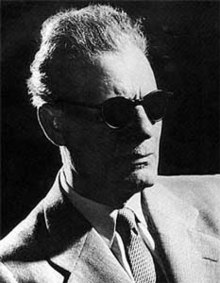Taha Hussein
Taha Hussein (15 November 1889—28 October 1973) (Arabic: طه حسين, Egyptian Arabic: [ˈtˤɑːhɑ ħ(e)ˈseːn], Arabic: [tˤaːha ħusajn]) wis ane o the maist influential 20t century Egyptian writers an intellectuals, an a figurheid for the Arab Renaissance an the modrenist muivement in the Arab Warld. His sobriquet wis "The Dean o Arabic Leeteratur".[2]
| Taha Hussein (طه حُسين) | |
|---|---|
 Taha Hussein | |
| Born | 15 November 1889 [1] Minya Govrenorate, Khedivate o Egyp |
| Dee'd | 28 October 1973 (aged 83)[1] Cairo, Egyp |
| Naitionality | Egyptian |
Taha Hussein wis born in Izbet el Kilo, a veelage in the Minya Govrenorate in central Upper Egyp. He went tae a kuttab, an thareefter wis admittit tae Al-Azhar Varsity, whaur he studiet releegion an Arabic leeteratur. Frae a early age, he wis reluctant tae tak the tradeetional eddication tae his hert. Hussein wis the seivent o thirteen childer, born intae a lawer-middle-class faimily. He became blind at the age o three, the result o faulty treatment bi a unskilled practitioner, a condeetion which caused him a great deal o anguish throuoot his entire life.
Hussein met an marriet Suzanne Bresseau (1895-1989) while attendin the Varsity o Montpellier in France. She wis referred tae as “sweet voice”. This name came from her ability tae read tae him as he wis tryin tae impruive his grasp o the French leid. Suzanne became his wife, best friend an the mither o his twa childer an wis his mentor throuoot his life.
Taha Hussein’s childer, his dochter Amina an her younger brither Moenis, were both important figures in Egypt. Amina, who dee'd at the age o 70, wis amang the first Egyptian weemen tae graduate frae Cairo Varsity. She an her brither, Moenis, translatit his Adib (The Intellectual) intae French. This wis especially important tae their faither, who wis a Egyptian who haed muivit tae Fraunce an learned the leid.
References
eedit- ↑ a b Cite error: Invalid
<ref>tag; no text was provided for refs namedfrcu - ↑ Ghanayim, M. (1994). "Mahmud Amin al-Alim: Between Politics and Literary Criticism". Poetics Today. Poetics Today, Vol. 15, No. 2. 15 (2): 321–338. doi:10.2307/1773168. JSTOR 1773168.